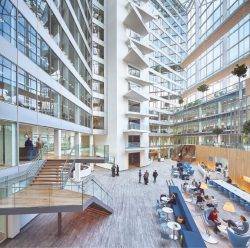February 22, 2018
Bisley announces plans to elevate the humble locker
 Bisley has launched Bisley LateralFile Lodge, a new range of lockers in response to the increased need within contemporary agile offices for personal, transient and temporary storage space. Bisley’s new range of personal storage provides a timely evolution to this essential element of office design. Key features include:
Bisley has launched Bisley LateralFile Lodge, a new range of lockers in response to the increased need within contemporary agile offices for personal, transient and temporary storage space. Bisley’s new range of personal storage provides a timely evolution to this essential element of office design. Key features include:
Power
Mobile technology is an essential tool for a majority of workers and running out of power can be disruptive. Bisley’s new lockers are powered, making it possible to take a laptop away to a desk, only to be charged again when it goes back in the locker overnight, locked safely away behind a simple barrel lock, digital combination locks or an RFID (Radio-Frequency Identification) lock.
Zoning
A range of seamless back and surface material options such as acoustic performance panels or dry-wipe boards, and the absence of tie bars, results in a slick and contemporary finish.
The aesthetic appeal and multi-use of the of these lockers means that they do not need to be located on the perimeter of the floorplate, but become an integral part of the interior design, zoning spaces, enhancing breakout spaces and encouraging movement amongst employees.
Personalisation
The ‘hard to reach’ bottom section of the locker stack can be modified to include a retractable personal drawer, maximising its capacity and accessible use. There is also the opportunity to further personalise each locker with business card/photo holders included as standard to increase the sense of ownership and belonging.
Choice and versatility
The range is available in a multitude of sizes (single or double height to suit requirements), colours, finishes and lock type. Planting tubs can be integrated on to the top of the storage units, enabling the incorporation of storage in biophillic workplace designs, increasingly popular due to the proven benefits for the wellbeing of employees. The wide range of aesthetics available for the tops and shelves, and the option of wood finish doors, mean the new locker range can be specified in any design scheme.
Helen Owen, Director of Business Development at Bisley says: “We accept that change is the only certainty in business but human nature will always dictate the need for employees to have a space that they can call their own. Lockers are a simple, effective and efficient way to provide this. The resurgence of the locker as the perfect storage solution for agile, dynamic workplaces, as well as supporting the co-working phenomenon is to be welcomed.”
The full range of lockers can be seen here:
https://www.bisley.com/products/storage/personal/lateralfile









 Corporate real estate departments need to become more effective partners in the agile transformation of their broader organizations., claims a new survey conducted by CBRE, in partnership with CoreNet Global. When describing Portfolio Agility, i.e. the ability to rapidly adapt, scale and reposition the organization’s real estate portfolio to support shifting enterprise needs, 67 percent consider portfolio agility as the most important type of agility for business success, yet only 14 percent consider themselves highly agile in this area. The most prevalent portfolio agility practices included negotiating flexible space options in the lease, seeking shorter and/or more flexible lease terms, supporting an enterprise-wide flex-work program and delivering free address work environments. The report states that new workplace guidelines for efficiency have altered the way companies plan for density and more occupiers are incorporating third-party ‘agile space’ into their overall real estate strategy.
Corporate real estate departments need to become more effective partners in the agile transformation of their broader organizations., claims a new survey conducted by CBRE, in partnership with CoreNet Global. When describing Portfolio Agility, i.e. the ability to rapidly adapt, scale and reposition the organization’s real estate portfolio to support shifting enterprise needs, 67 percent consider portfolio agility as the most important type of agility for business success, yet only 14 percent consider themselves highly agile in this area. The most prevalent portfolio agility practices included negotiating flexible space options in the lease, seeking shorter and/or more flexible lease terms, supporting an enterprise-wide flex-work program and delivering free address work environments. The report states that new workplace guidelines for efficiency have altered the way companies plan for density and more occupiers are incorporating third-party ‘agile space’ into their overall real estate strategy.
 In a workplace dominated by insecurity, gig work and intelligent machines we need to improve our understanding of their potential impact on health, safety and wellbeing claims a new report.
In a workplace dominated by insecurity, gig work and intelligent machines we need to improve our understanding of their potential impact on health, safety and wellbeing claims a new report. 






 A third of workers (32 percent) regularly struggle to be productive in their job, and one in six (16 percent) blame their manager – claims a new survey from ADP. This puts bad management ahead of inefficient systems and processes (15 percent) and staff shortages (13 percent) as the biggest drain on productivity in the UK workplace. The UK has been grappling with low productivity levels for a number of years, consistently placed behind other leading economies, such as Germany and the US in official productivity tables. While recent ONS figures suggested a recovery is underway, reporting
A third of workers (32 percent) regularly struggle to be productive in their job, and one in six (16 percent) blame their manager – claims a new survey from ADP. This puts bad management ahead of inefficient systems and processes (15 percent) and staff shortages (13 percent) as the biggest drain on productivity in the UK workplace. The UK has been grappling with low productivity levels for a number of years, consistently placed behind other leading economies, such as Germany and the US in official productivity tables. While recent ONS figures suggested a recovery is underway, reporting 




 Most people who work in HR now recognise how essential technology is for delivering more strategic value to their organisation, but a new report suggests that HR teams are not prepared to meet the
Most people who work in HR now recognise how essential technology is for delivering more strategic value to their organisation, but a new report suggests that HR teams are not prepared to meet the 
 The creative team behind the development of the world’s most sustainable building – The Edge in Amsterdam – has announced the launch of a real estate technology company. EDGE Technologies, launched by OVG Real Estate CEO Coen van Oostrom will focus on creating a new generation of buildings which feature the latest innovations in sustainability and wellbeing. Whereas parent company OVG is focussed exclusively on the development of its existing portfolio, EDGE Technologies will focus on both the development and the long-term operations of this new generation of buildings, aiming for a cohesive experience across cities. Each EDGE building will be built and operated on the same technology platform and offer consistent user-centred design, created to serve the needs of today’s fast-changing and demanding workforce. To help achieve this the new company is launching a product that will capture and aggregate data across its properties in order to optimize, measure and inform both the user experience and the building’s environmental performance.
The creative team behind the development of the world’s most sustainable building – The Edge in Amsterdam – has announced the launch of a real estate technology company. EDGE Technologies, launched by OVG Real Estate CEO Coen van Oostrom will focus on creating a new generation of buildings which feature the latest innovations in sustainability and wellbeing. Whereas parent company OVG is focussed exclusively on the development of its existing portfolio, EDGE Technologies will focus on both the development and the long-term operations of this new generation of buildings, aiming for a cohesive experience across cities. Each EDGE building will be built and operated on the same technology platform and offer consistent user-centred design, created to serve the needs of today’s fast-changing and demanding workforce. To help achieve this the new company is launching a product that will capture and aggregate data across its properties in order to optimize, measure and inform both the user experience and the building’s environmental performance. 








February 12, 2018
Luther, Marx, Engels and a nailed-on manifesto for workplace change
by Mark Eltringham • Comment, Facilities management, Workplace design
(more…)